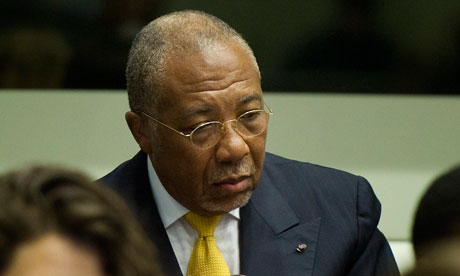
Liberian ex-president Charles Taylor
listens to the judge passing his sentencing at the court in The Hague.
Judges at an international war crimes court have sentenced Liberia's former president Charles Taylor to 50 years in prison for war crimes during the long-running civil war in Sierra Leone.
Taylor was found guilty last month of 11 counts of aiding and abetting war crimes and crimes against humanity by supporting rebels between 1996 and 2002 in return for conflict diamonds. He was convicted of offences including murder, rape, sexual slavery, recruiting child soldiers, enforced amputations and pillage.
Delivering the sentence on Wednesday, Judge Richard Lussick said Taylor's crimes were of the "utmost gravity in terms of scale and brutality".
The special court for Sierra Leone (SCSL) in The Hague cannot impose capital punishment or life imprisonment but prosecutors had called for Taylor to be given an 80-year prison term.
The 64-year-old warlord-turned-president is the first former head of state convicted by an international war crimes court since the second world war.
Taylor's sentence is likely to be served in the UK, which has offered to take him once his trial and appeal are completed. The civil war left more than 50,000 dead in the west African state.
Taylor's defence lawyers have told the court that exiling him to Britain's jails – where a Serbian war crimes convict was attacked in his cell two years ago – would leave him "culturally isolated" and constitute a "punishment within a punishment".
In an interim sentencing hearing, the court's chief prosecutor, Brenda Hollis, a former US military prosecutor, said: "[His] positions both as president of Liberia and within the west African regional bodies distinguish him from any other individual that has appeared before this court.
"Taylor's abuse of his authority and influence is especially egregious given that west African leaders repeatedly entrusted him with a role to facilitate peace."
In his final address to the UN-backed tribunal the 64-year-old denied encouraging human rights abuses during the prolonged civil war in neighbouring Sierra Leone, insisting he had in fact been trying to stabilise the region. The court should deliver its sentence in a spirit of "reconciliation, not retribution", said Taylor, who offered no admission of wrongdoing or words of remorse. "I express my sadness and sympathy for crimes suffered by individuals and families in Sierra Leone," he told the panel of judges at the SCSL.
"What I did to bring peace to Sierra Leone was done with honour. I was convinced that unless there was peace in Sierra Leone, Liberia would not be able to move forward. I pushed the peace process hard, contrary to how I have been portrayed in this court."
Why do I feel like some people in Nigeria deserve this treatment?
Taylor was found guilty last month of 11 counts of aiding and abetting war crimes and crimes against humanity by supporting rebels between 1996 and 2002 in return for conflict diamonds. He was convicted of offences including murder, rape, sexual slavery, recruiting child soldiers, enforced amputations and pillage.
Delivering the sentence on Wednesday, Judge Richard Lussick said Taylor's crimes were of the "utmost gravity in terms of scale and brutality".
The special court for Sierra Leone (SCSL) in The Hague cannot impose capital punishment or life imprisonment but prosecutors had called for Taylor to be given an 80-year prison term.
The 64-year-old warlord-turned-president is the first former head of state convicted by an international war crimes court since the second world war.
Taylor's sentence is likely to be served in the UK, which has offered to take him once his trial and appeal are completed. The civil war left more than 50,000 dead in the west African state.
Taylor's defence lawyers have told the court that exiling him to Britain's jails – where a Serbian war crimes convict was attacked in his cell two years ago – would leave him "culturally isolated" and constitute a "punishment within a punishment".
In an interim sentencing hearing, the court's chief prosecutor, Brenda Hollis, a former US military prosecutor, said: "[His] positions both as president of Liberia and within the west African regional bodies distinguish him from any other individual that has appeared before this court.
"Taylor's abuse of his authority and influence is especially egregious given that west African leaders repeatedly entrusted him with a role to facilitate peace."
In his final address to the UN-backed tribunal the 64-year-old denied encouraging human rights abuses during the prolonged civil war in neighbouring Sierra Leone, insisting he had in fact been trying to stabilise the region. The court should deliver its sentence in a spirit of "reconciliation, not retribution", said Taylor, who offered no admission of wrongdoing or words of remorse. "I express my sadness and sympathy for crimes suffered by individuals and families in Sierra Leone," he told the panel of judges at the SCSL.
"What I did to bring peace to Sierra Leone was done with honour. I was convinced that unless there was peace in Sierra Leone, Liberia would not be able to move forward. I pushed the peace process hard, contrary to how I have been portrayed in this court."
Why do I feel like some people in Nigeria deserve this treatment?























0 comments:
Post a Comment
We Love To Hear What You think About The Post Or Blog.